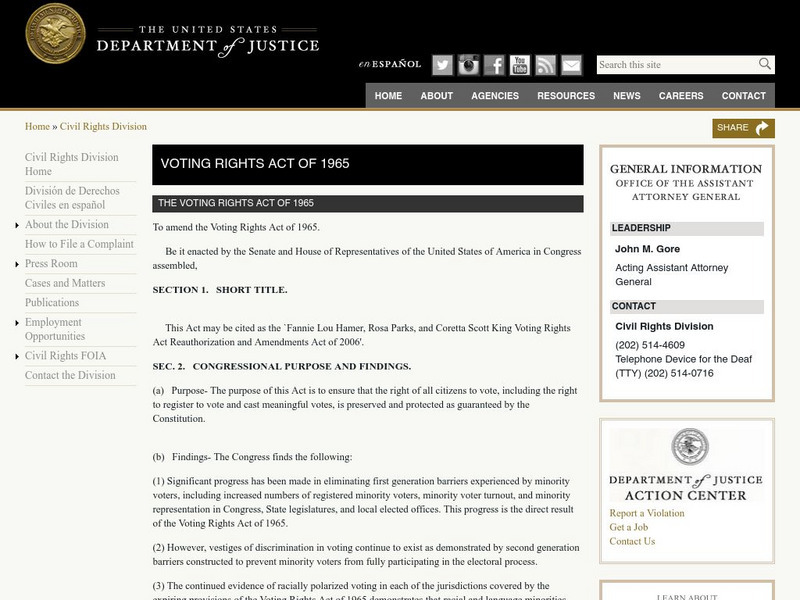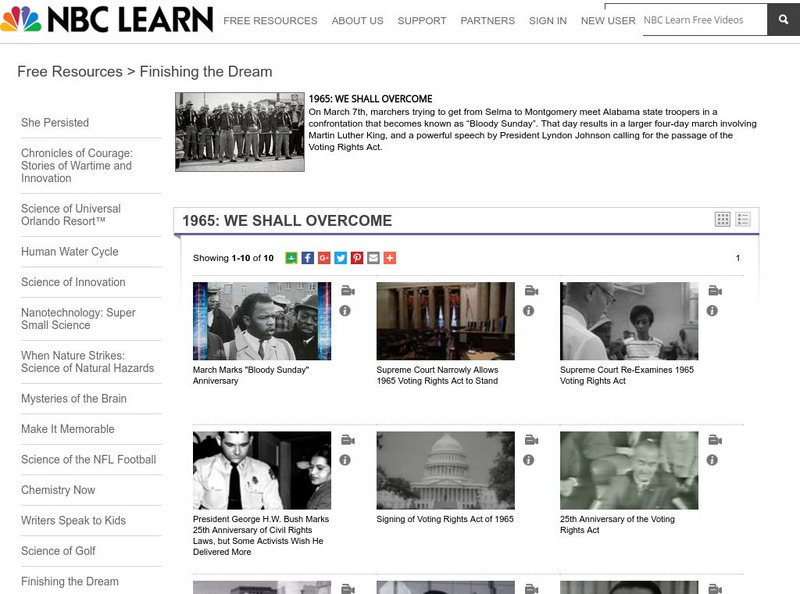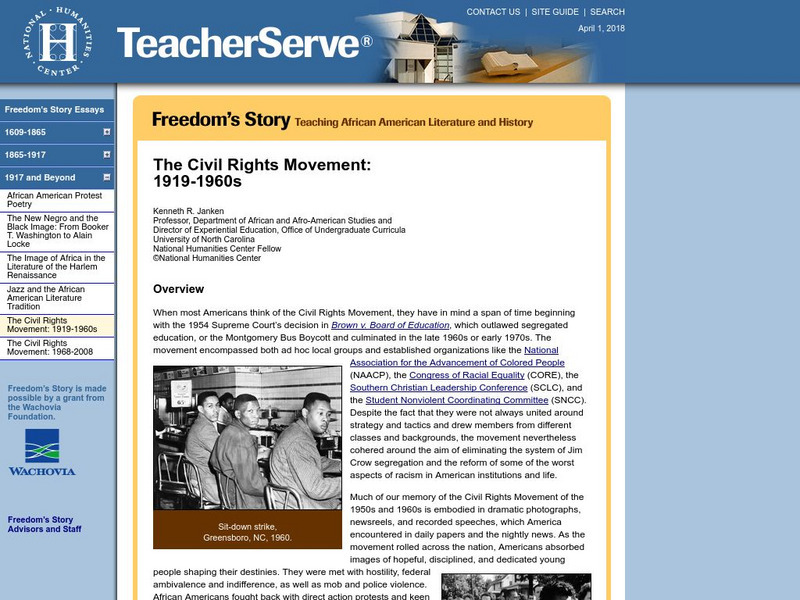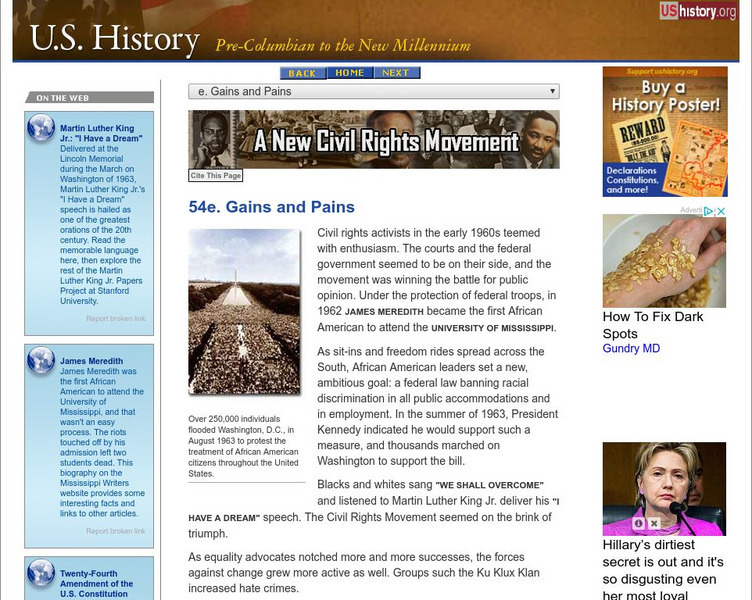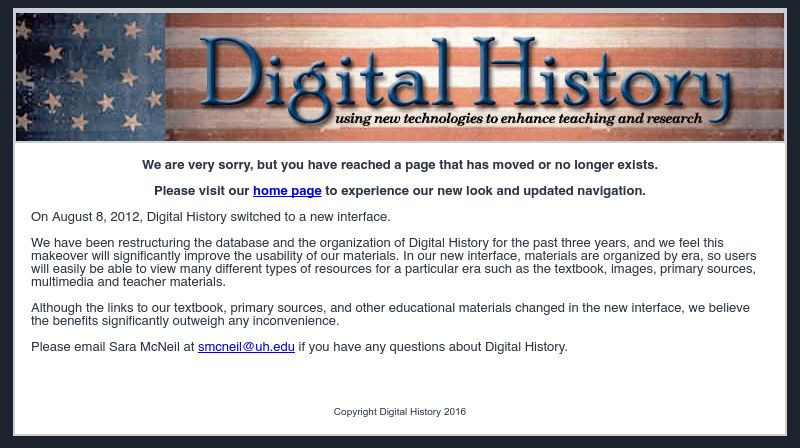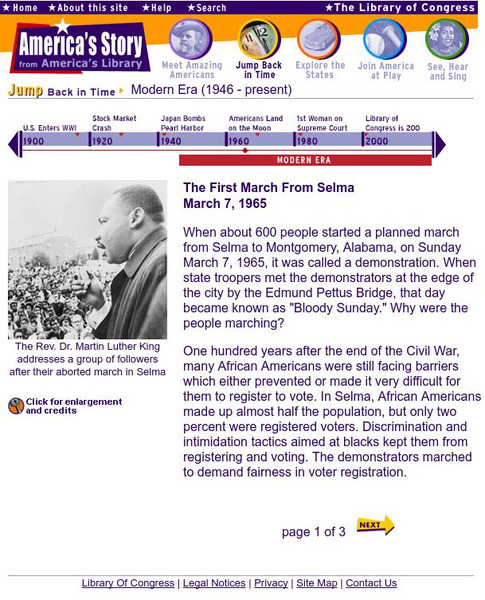US Department of Justice
Civil Rights Division: Voting Rights Act 1965
Read the amendments to the Voting Rights Act made in 2006. The Congress revisited the original act to assess the progress and what still needed to be addressed.
Khan Academy
Khan Academy: The Civil Rights Act of 1964 and the Voting Rights Act of 1965
Read about the Civil Rights Act of 1964 and the Voting Rights Act of 1965 which sought to make discrimination illegal, and the resistance they faced from the public and government officials. As time passed, African Americans began to...
Other
Fair Vote: X's and O's: A History of the Voting Rights Act and African Americans
Documented essay on the history of black suffrage in American and the significance of the Voting Rights Act of 1965.
US National Archives
Our Documents: Voting Rights Act (1965)
Included at this site is the complete text and images of the original document of the Voting Rights Act of 1965. This law outlawed the discriminatory voting practices that African Americans had endured.
Khan Academy
Khan Academy: Us History: 1945 1980:civil Rights Act 1964/voting Rights Act 1965
Learn about the civil rights legislation that outlawed discrimination in jobs, education, housing, public accommodations, and voting.
The Dirksen Congressional Center
Congress Link: Voting Rights Act of 1965
Explores the Voting Rights Act of 1965 from the perspective of a Congressional leader. Presents an abundant amount of historical information about the origins of the Act as well as the steps needed to get it passed.
PBS
Pbs Learning Media: Primary Source Set: Voting Rights Act of 1965
This collection uses primary sources to explore the Voting Rights Act of 1965.
NBC
Nbc Learn: Finishing the Dream: 1965: We Shall Overcome
A collection of archival video clips highlighting a peaceful protest in Alabama in 1965 that ended in a confrontation with state troopers known as "Bloody Sunday." This was followed by a four-day march with Martin Luther King, Jr., and a...
Curated OER
National Park Service: International Civil Rights Walk of Fame: Lyndon Johnson
Read about President Lyndon Johnson's on how to end poverty in the United States as well as how to protect civil rights.
National Humanities Center
National Humanities Center: Teacher Serve: The Civil Rights Movement: 1919 1960s
Article provides an overview of the Civil Rights Movement in America between 1919 and the 1960s with detailed discussion on racial equality, nonviolence and passive resistance, and segregation.
Raleigh Charter High School
Mrs. Newmark's Page: Civil Rights
This interactive activity focuses on the Civil Rights Movement.
Texas Education Agency
Texas Gateway: The Civil Rights Movement and Voting Rights
Given the voting rights amendments, students will create an annotated time line that illustrates how voting rights have been extended to various groups of people throughout the history of the United States.
Digital Public Library of America
Dpla: Voting Rights Act of 1965
This collection uses primary sources to explore the Voting Rights Act of 1965. Set includes an overview, primary sources, links to related resources, and a teaching guide.
PBS
Wnet: Thirteen: Rise and Fall of Jim Crow: A National Struggle: Congress
This two-page segment of a larger PBS site about Jim Crow discusses the role of Congress over close to 100 years in first entrenching Jim Crow laws in the law of the land, and eventually, through the Civil Rights Act of 1965 and the...
PBS
Pbs Learning Media: Martin Luther King Jr.: Civil Rights Leader
Students will explore how King's deep-seated commitment to nonviolence contributed to the expansion of social justice in the United States, particularly for African Americans.
Curated OER
History Matters: "And We Shall Overcome": Johnson's Special Message to Congress
Read President Lyndon B. Johnson's speech before the the Congress in support of the Voting Rights Act. Feel the passion in his address and his desire to further racial equality.
Black Past
Black Past: Wilkins, Roy
This encyclopedia entry recounts briefly the life of Roy Wilkins, a very influential civil rights leader.
Alabama Humanities Foundation
Encyclopedia of Alabama: Selma to Montgomery March
One of the most famous events in Civil Rights history, this report covers the Selma to Montgomery March for voting rights.
Digital History
Digital History: Affirmative Action and the Case of Allan Bakke [Pdf]
The history of affirmative action was interwoven with the Civil Rights Act of 1964 and the Voting Rights Act of 1965. Read about how the federal government under both President Kennedy and President Nixon attempted to open up jobs to...
Independence Hall Association
U.s. History: Gains and Pains
Read about the legal gains made by the civil rights movement, including the Civil Rights Act of 1964, juxtaposed against the real-life actions meant to deny African Americans their right to racial equality not just legally, but...
Digital History
Digital History: The Great Society and the Drive for Black Equality
Read about President Lyndon Johnson's vision for the Great Society. See how the programs instituted were focused on lifting the poor from poverty, especially African Americans. Included were laws to increase civil rights and voting...
Independence Hall Association
U.s. History: Martin Luther King, Jr.
A brief biography of civil rights hero, Martin Luther King, Jr. This article touches on his early life, but focuses on his actions as a leader of nonviolent change to bring equality to African Americans. Find a speech given by Robert...
Library of Congress
Loc: America's Story: The First March From Selma
This article details a key event in the civil rights struggle--the demonstration organized by the Rev. Martin Luther King in Selma, Alabama on March 7, 1965, when 525 people met a police blockade on the Edmund Pettus Bridge.
Gilder Lehrman Institute of American History
Gilder Lehrman Institute: History Now: Securing the Right to Vote: Selma to Montgomery Story
[Free Registration/Login Required] Lesson plan asking this essential question: "What conditions created a need for a protest march from Selma to Montgomery in 1965 and what did that march achieve?"
